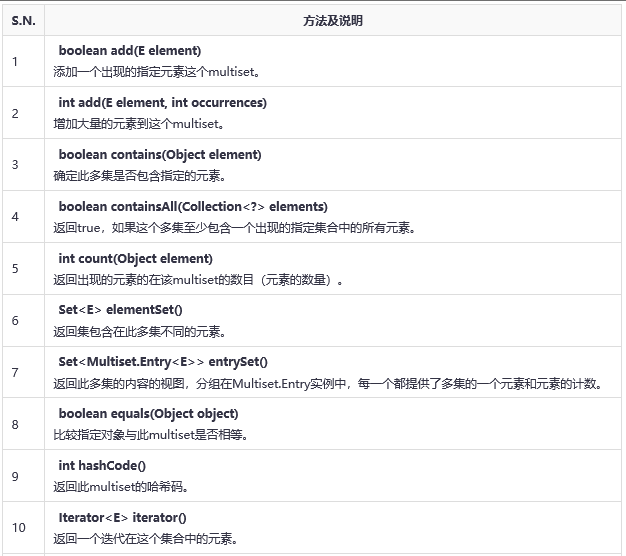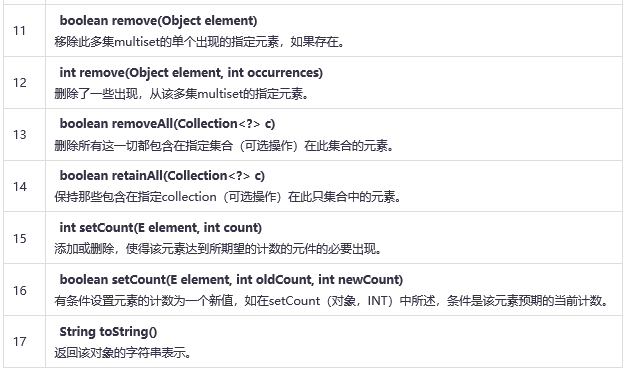
Guava教程
Multiset接口扩展设置有重复的元素,并提供了各种实用的方法来处理这样的元素在集合中出现。
以下是com.google.common.collect.Multiset<E>接口的声明:
@GwtCompatible
public interface Multiset<E>
extends Collection<E>
接口方法


此接口继承从以下接口方法: java.util.Collection
使用所选择的编辑器创建下面的java程序,比如说 C:/> Guava
GuavaTester.java
import java.util.Iterator;
import java.util.Set;
import com.google.common.collect.HashMultiset;
import com.google.common.collect.Multiset;
public class GuavaTester {
public static void main(String args[]){
//create a multiset collection
Multiset<String> multiset = HashMultiset.create();
multiset.add("a");
multiset.add("b");
multiset.add("c");
multiset.add("d");
multiset.add("a");
multiset.add("b");
multiset.add("c");
multiset.add("b");
multiset.add("b");
multiset.add("b");
//print the occurrence of an element
System.out.println("Occurrence of 'b' : "+multiset.count("b"));
//print the total size of the multiset
System.out.println("Total Size : "+multiset.size());
//get the distinct elements of the multiset as set
Set<String> set = multiset.elementSet();
//display the elements of the set
System.out.println("Set [");
for (String s : set) {
System.out.println(s);
}
System.out.println("]");
//display all the elements of the multiset using iterator
Iterator<String> iterator = multiset.iterator();
System.out.println("MultiSet [");
while(iterator.hasNext()){
System.out.println(iterator.next());
}
System.out.println("]");
//display the distinct elements of the multiset with their occurrence count
System.out.println("MultiSet [");
for (Multiset.Entry<String> entry : multiset.entrySet())
{
System.out.println("Element: "+entry.getElement() +", Occurrence(s): " + entry.getCount());
}
System.out.println("]");
//remove extra occurrences
multiset.remove("b",2);
//print the occurrence of an element
System.out.println("Occurence of 'b' : "+multiset.count("b"));
}
}
验证结果
使用javac编译器编译如下类
C:\Guava>javac GuavaTester.java
现在运行GuavaTester看到的结果
C:\Guava>java GuavaTester
看到结果
Occurence of 'b' : 5
Total Size : 10
Set [
d
b
c
a
]
MultiSet [
d
b
b
b
b
b
c
c
a
a
]
MultiSet [
Element: d, Occurence(s): 1
Element: b, Occurence(s): 5
Element: c, Occurence(s): 2
Element: a, Occurence(s): 2
]
Occurence of 'b' : 3
转载自并发编程网-ifeve.com